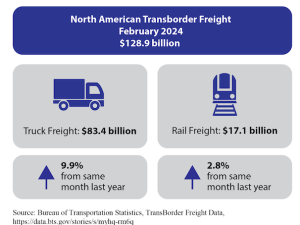Speaking before the Surface Transportation Board (STB), American Chemistry Council's President and CEO Jack N. Gerard reaffirmed the importance of the railroad's obligation to serve the needs of the nation, and called for stronger action by the STB to address the growing monopoly power of the railroads over their customers.
"Railroads have an obligation to serve the transportation needs of the country," Gerard said. "They are required to operate in the public interest because the public depends on safe and reliable service in the delivery of a wide range of products." Their obligation, the common carrier requirement, is a debt the railroads owe to the nation.
"The railroads received enormous grants of land in the 19th Century in the public interest to develop rail service for the public use, convenience and necessity," Representative James Oberstar (D-MN), Chairman of the House of Representatives Committee on Transportation and Infrastructure, recently recounted.
"We're concerned, however, that with today's hearing the Board is pursuing the wrong line of questioning. For the past 25 years, we have watched the railroads consolidate so that a handful of railroads control 90 percent of all rail freight traffic in the United States. This new-found market power has doubled industry-wide profits since 2003 and sent rail stock prices soaring," Gerard explained. "To even consider reducing the common carrier obligation instead of addressing the current barriers to competition in the freight rail system would only serve to extend the monopoly power the railroads currently enjoy over their customers."
Chemical companies rely on rail transportation to deliver 170 million tons of essential chemicals each year to customers in manufacturing, agriculture, energy, transportation technology, communications, health, education defense and virtually every aspect of life in America. "More than 96 percent of all manufactured goods are directly touched by chemistry," Gerard explained.
"We've witnessed a century of safe transportation of these critical materials, but the NTSB has determined that the cause of several recent fatal accidents were railroad maintenance and operational failures," Gerard continued. "Now with increased traffic and perceived capacity constraints the railroads wish to avoid their common carrier obligation for hazardous materials to focus on other traffic. This clearly has nothing to do with the public interest."
Rather than face the liability associated with their performance, the railroads want to simply void their common carrier "contract" with the American people. "The railroads argue that it is not in their interest to move these vital materials," Gerard explained. "This raises several serious questions, including which of the thousands of products made from chemicals, and the jobs of Americans who make these products, do the railroads wish to eliminate from U.S. commerce? These materials are critical for the production of life saving medications and medical devices, body armor used by our military and law enforcement officers, deicing fluids for airplanes, energy saving solar panels, and so much more."
"To make matters worse, the railroads are trying to sell a fantasy that there are benign alternatives to all these crucial materials in order to avoid their responsibility and appropriate liability for the safe transportation of these products," Gerard continued. "Railroads, as well as hazardous materials shippers, should continue to bear liability for their own actions. Removing that liability could erode safety performance by creating a disincentive to address the multitude of factors to enhance rail safety."
Many of the issues raised in today's hearing could be addressed by increasing access to competitive freight rail service. For example, Gerard explained that removing the barriers to competition would "improve the efficiency of the system" and "in many instances, reduce the







